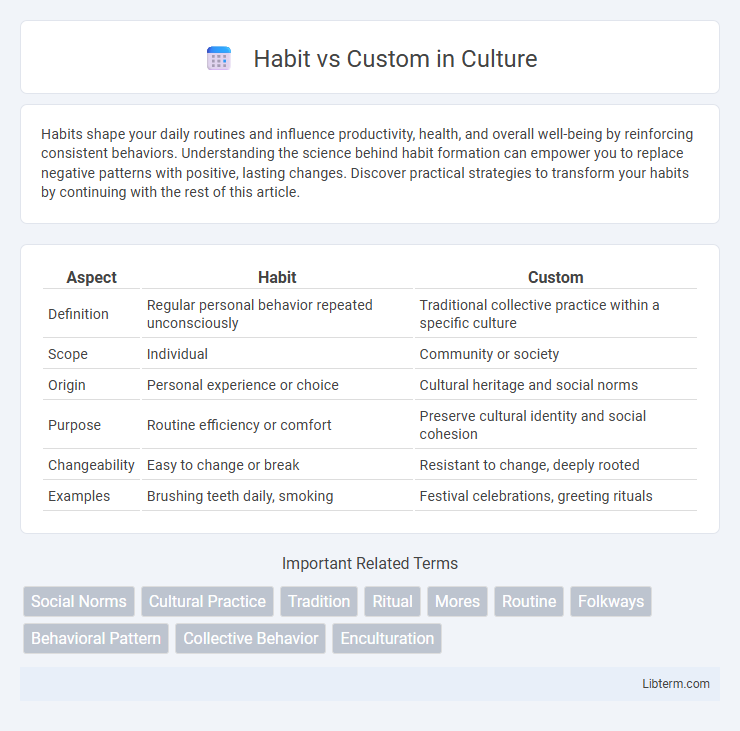Habits shape your daily routines and influence productivity, health, and overall well-being by reinforcing consistent behaviors. Understanding the science behind habit formation can empower you to replace negative patterns with positive, lasting changes. Discover practical strategies to transform your habits by continuing with the rest of this article.
Table of Comparison
| Aspect | Habit | Custom |
|---|---|---|
| Definition | Regular personal behavior repeated unconsciously | Traditional collective practice within a specific culture |
| Scope | Individual | Community or society |
| Origin | Personal experience or choice | Cultural heritage and social norms |
| Purpose | Routine efficiency or comfort | Preserve cultural identity and social cohesion |
| Changeability | Easy to change or break | Resistant to change, deeply rooted |
| Examples | Brushing teeth daily, smoking | Festival celebrations, greeting rituals |
Understanding the Difference: Habit vs Custom
Habits are individual behaviors formed through repetition, often automatic and unconscious, while customs are collective social practices established by cultural or community norms. Habits typically influence personal routines, whereas customs shape group identity and societal expectations. Understanding the difference highlights how personal actions evolve into shared traditions over time.
Defining Habit: Personal Patterns Explained
A habit is a repetitive behavior performed automatically in response to specific cues, reflecting an individual's personal routines and neurological conditioning. It develops through consistent practice and often operates below conscious awareness, reinforcing patterns of thought and action. Understanding habits involves analyzing the interplay between triggers, routines, and rewards that shape personal behavior over time.
What is a Custom? Social Practices Unveiled
A custom is a social practice widely accepted and repeated within a community or culture, shaping collective behavior and identity over time. Unlike personal habits, customs carry symbolic meanings and are often linked to traditions, rituals, or social norms, influencing how individuals interact in specific contexts. Examples include greeting rituals, holiday celebrations, and dress codes that reinforce group cohesion and cultural continuity.
Origins: How Habits and Customs Develop
Habits develop through repetitive personal behaviors reinforced over time by individual experiences and neurological patterns. Customs emerge from collective actions rooted in cultural, social, or religious traditions passed down across generations. The origin of habits is primarily psychological, while customs originate from societal norms and shared values.
The Role of Habits in Daily Life
Habits play a crucial role in daily life by automating routine behaviors that enhance efficiency and reduce cognitive load. Unlike customs, which are socially shared practices tied to cultural identity, habits are individual patterns formed through repeated actions and reinforcement. Understanding how habits shape daily decisions can improve personal productivity and promote healthier lifestyle choices.
Customs and their Influence on Society
Customs shape societal behavior by establishing shared practices and norms that foster social cohesion and cultural identity. These collective traditions influence legal systems, rituals, and communication patterns, reinforcing community values across generations. Persistent customs contribute to social stability and continuity, guiding individual actions within the broader cultural context.
Psychological Aspects: Why We Form Habits and Customs
Habits form through repetitive behavior that creates neural pathways in the brain, making actions automatic and efficient. Customs arise from social interactions and shared cultural values, reinforcing group identity and cohesion. Psychological factors such as reinforcement, social approval, and cognitive ease drive both habits and customs, shaping individual and collective behavior patterns.
Habitual Actions vs Traditional Rituals
Habitual actions are repetitive behaviors performed unconsciously, such as brushing teeth daily, whereas traditional rituals are structured, culturally significant practices often involving ceremonies or symbolic meanings, like wedding rites. While habits develop through personal repetition and serve practical purposes, customs are collectively maintained, reinforcing social identity and continuity across generations. Understanding the distinction between individual habitual actions and communal traditional rituals highlights the interplay between personal routine and cultural heritage.
Cultural Impact: Customs Around the World
Customs are deeply embedded in cultural heritage, shaping social norms and traditions unique to each society. While habits are individual behaviors developed over time, customs represent collective practices that reinforce group identity and continuity. Customs around the world vary widely, influencing rituals, festivals, and daily interactions within diverse communities.
Changing Habits and Customs: Adaptation in Modern Times
Changing habits involves altering individual behaviors over time through repetition and conscious effort, while changing customs requires shifts in collective social practices and cultural norms. Modern globalization and technological advancements accelerate the adaptation of customs, enabling societies to blend traditions with contemporary influences. Effective adaptation depends on balancing preservation of cultural identity with openness to innovation, ensuring sustainable integration of new habits and customs.
Habit Infographic

 libterm.com
libterm.com